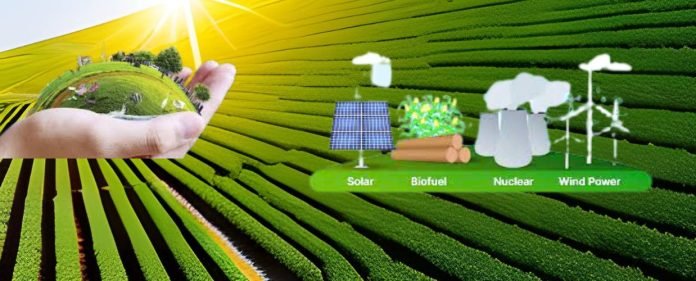In an era marked by environmental concerns and the growing need for sustainable solutions, renewable energy has emerged as a beacon of hope for a cleaner and greener world. As we grapple with the challenges posed by climate change and depleting fossil fuel reserves, the transition to renewable energy sources has gained momentum. This article delves into the significance of renewable energy, its various forms, advantages, challenges, and the pivotal role it plays in shaping the future of our planet.
Renewable Energy, A Path to Sustainability
In today’s rapidly changing world, the importance of sustainable energy sources cannot be overstated. It is the key to unlocking a future that meets our energy needs without compromising the planet’s well-being. Unlike finite fossil fuels such as coal, oil, and natural gas, it derives from sources continually replenished by natural processes. By harnessing the power of wind, sunlight, water, and other natural elements, we can generate energy in an environmentally friendly and economically viable way.
Renewable energy technologies have the potential to drastically reduce our reliance on fossil fuels, which are significant contributors to air pollution, greenhouse gas emissions, and climate change. These technologies offer a promising solution to the dual challenge of meeting rising energy demands and mitigating the negative impacts of traditional energy sources. By embracing it, we are taking a proactive step toward a more sustainable and resilient future.
Forms of Renewable Energy
Renewable energy encompasses a diverse array of technologies that harness different natural resources.
Solar Energy
Solar energy, a prime example of clean and renewable power, harnesses the sun’s immense energy. Photovoltaic (PV) cells convert sunlight directly into electricity, while solar thermal systems use sunlight to heat a fluid, which in turn generates steam to drive turbines. Solar panels have become ubiquitous on rooftops, generating clean electricity while reducing reliance on conventional power grids.
Wind Energy
Wind energy capitalizes on the kinetic energy of moving air masses. Wind turbines, often grouped in wind farms, capture this energy, and convert it into electrical power. As the wind blows, the turbines’ blades rotate, driving a generator to produce electricity. Wind power is a versatile and abundant resource, with onshore and offshore wind farms harnessing the energy of breezes over land and sea.
Hydropower
Hydropower, also known as hydroelectric power, harnesses the energy of flowing water to generate electricity. Dams, reservoirs, and turbines work in tandem to convert the kinetic energy of moving water into mechanical energy, which is then transformed into electrical energy. Large-scale hydropower installations, such as the Hoover Dam in the United States or the Three Gorges Dam in China, have substantial energy-generating capacities.
Geothermal Energy
Geothermal energy taps into the Earth’s internal heat, which originates from the planet’s formation and the natural decay of radioactive isotopes. This heat is harnessed through geothermal power plants that use steam or hot water from underground reservoirs to generate electricity. Geothermal energy is reliable and consistent, making it a valuable power source, particularly in regions with geothermal activity.
Biomass Energy
Biomass energy is derived from organic materials such as wood, agricultural residues, and organic waste. These materials can be burned directly for heat or converted into biofuels, such as ethanol and biodiesel. Bioenergy is considered carbon-neutral, as the carbon dioxide released during combustion is offset by the carbon absorbed by plants during their growth.
Advantages of Renewable Energy
The adoption of renewable energy offers a multitude of benefits that extend beyond environmental preservation.
Mitigation of Climate Change
One of the most compelling reasons to embrace renewable energy is its potential to mitigate climate change. Unlike fossil fuels, which release carbon dioxide and other greenhouse gases when burned, it sources generate little to no emissions during operation. By reducing our reliance on fossil fuels, we can significantly curtail global warming, reduce air pollution, and mitigate the impacts of climate change on ecosystems and communities.
Energy Independence and Security
Renewable energy sources contribute to energy independence by utilizing locally available resources. This reduces dependence on imported fossil fuels, which are subject to price fluctuations and geopolitical tensions. Countries that invest in renewable energy bolster their energy security and resilience, ensuring a stable energy supply for their citizens and industries.
Job Creation and Economic Growth
The renewable energy sector is a source of job creation and economic growth. The projects create by it give many employment opportunities, from manufacturing and installation to operation and maintenance. These jobs are distributed across various skill levels and sectors, contributing to local economies, and stimulating innovation in clean energy technologies.
Sustainable Development
Renewable energy plays a crucial role in promoting sustainable development. Access to affordable and reliable energy is fundamental to economic progress and human well-being. By providing clean energy alternatives to underserved communities, renewable sources improve living standards, enhance education and healthcare services, and foster social and economic empowerment.
Challenges and the Path Forward
While the benefits of renewable energy are undeniable, challenges persist in its widespread adoption.
Intermittency and Storage
Some renewable energy sources, such as solar and wind, are intermittent by nature. The availability of sunlight and wind can vary, leading to fluctuations in energy production. Developing efficient energy storage systems, such as advanced batteries and pumped hydro storage, is essential to store excess energy generated during peak periods and release it when demand is high.
Infrastructure and Grid Integration
Integrating it into existing power grids presents technical and logistical challenges. Smart grid technologies, demand-response mechanisms, and advanced energy management systems are required to balance supply and demand, especially in regions with high levels of renewable energy penetration. Upgrading transmission and distribution infrastructure is also necessary to accommodate the decentralized nature of renewable energy sources.
Initial Costs
While technologies of it offer long-term cost savings, the initial capital investment can be higher than that of conventional energy sources. Governments, businesses, and financial institutions play a crucial role in providing incentives, subsidies, and favorable financing options to accelerate the adoption of renewable energy technologies. As economies of scale are realized, and technology costs continue to decrease, the affordability of renewable energy will further improve.
Conclusion Empowering a Sustainable Future
The shift to renewable energy is a critical step toward a sustainable and resilient future for current and future generations. By harnessing nature’s abundant and inexhaustible power, we can reduce our carbon footprint, combat climate change, and ensure a cleaner and healthier planet. As technological advancements continue to drive innovation, the efficiency and accessibility of renewable energy sources will only improve. Governments, industries, and individuals must collaborate to accelerate the transition to renewable energy, making it an integral part of the global energy mix. By embracing renewable energy, we address today’s environmental challenges and pave the way for a brighter, cleaner, and more sustainable tomorrow.



